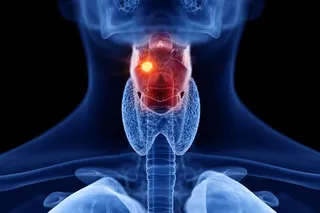Alzheimer’s disease is characterized by a slow yet steady progression of memory loss. It often begins with simple omissions like forgetting a name before eventually robbing its host of the ability to perform basic tasks such as getting dressed.
The Stages of Alzheimer's Disease
But how, exactly, does this progression unfold? Medical professionals often break down the disorder into the following stages:
1. Preclinical Stage
This phase can last up to 20 years before the person even has any signs of disease — yet misbehaving proteins in the brain are already setting the stage for a takeover.
It starts with a sticky form of a protein called amyloid. This sticky nature makes it unable to dissolve and pass through our urine like it normally would, says Nicole Absar, neuropsychiatrist and attending physician at the Stony Brook Center of Excellence for Alzheimer’s Disease.
“[The amyloid proteins] get glued together almost like a cancer cell,” Absar says. “They replace all the healthy tissue after the amyloid clots.” Meanwhile, another type of protein called Tau, forms tangles in the brain and together the two begin to obliterate memories and functioning in the brain.
Read More: Beta-amyloid and Tau: What Do These Proteins Have to do With Alzheimer’s?
A pet scan or lumbar puncture at this stage would reveal the presence of these harmful proteins, but the tests are costly — and many patients wouldn’t bother with them if they weren’t experiencing symptoms. Absar says she would like to see screening for Alzheimer’s testing become as routine as mammograms or colonoscopies.
Now that the FDA has just granted full approval of a drug shown to slow down the growth of these harmful amyloid proteins, doctors — including Doug Sharre, director of the Division of Cognitive Neurology at Ohio State Wexner Medical Center — say the incentive for screenings like this is now greater than ever.
Read More: A Tiny Discovery Could Revolutionize Research Into Neurodegenerative Diseases
2. Mild Cognitive Impairment
Getting lost, struggling to find the right word or a decreased ability to problem solve and stay organized over a six month period are all potential signs of the onset of the disease, says Scharre, who developed the SAGE test used in many doctor's offices to test for Alzheimer's
“[Patients] are still able to do their day to day activities although they may need reminders to do them or how to do them,” Scharre says. “It is the stage when it is critical to sort out if there is an underlying condition or if it is just normal aging.”
Typically, Scharre continues, a family member can help determine whether the patient is struggling more with a cognitive issue.
“Neuropsychological testing or cognitive testing can also show mild changes in certain cognitive domains like memory or complex comprehension/understanding,” adds Absar.
Read More: Combat Cognitive Decline With These 5 Activities
3. Mild Alzheimer’s
This is the stage where a patient might need some additional help to get through the day. The patient might require assistance with managing their medication schedule or setting up doctors’ appointments. Absar says.
Tasks such as balancing the checkbook or preparing tax documents may also be too overwhelming for the patient to handle. Behavior issues such as sudden mood changes, suspiciousness, false beliefs, restlessness, sleep issues and anger also appear around this time too and are related to brain damage from Alzheimer's disease, notes Sharre.
Read More: Why Do People With Alzheimer's Tend to Sleep a Lot?
4. Moderate Alzheimer’s
By this stage, the patient is probably not driving as navigation and depth perception have become prominent issues, says Absar.
Technology is probably also a big source of frustration for the Alzheimer’s patient at this point, Sharre says. They will likely need help with their cell phone, as well as with other household appliances like microwaves and laundry machines. At this point, though, they are likely still capable of bathing and dressing themselves.
Read More: How to Talk to Someone With Dementia
5. Severe Alzheimer’s
At this stage, the patient needs help with basic day to day activities such as grooming, bathing, dressing and using the bathroom, says Scharre.
6. Very Severe Alzheimer’s
This is when the patient relies on round the clock care and requires help with basic activities such as eating their meals. At this point in the disease's progression, the patient has likely lost control of their bladder and bowels and has extremely limited communication skills, says Scharre. The disease is ultimately fatal.
“It’s a sad disease, but it starts with very subtle symptoms,” says Absar, who strongly recommends anyone who suspects they may be experiencing Alzheimer’s symptoms get checked immediately. She notes that many treatable conditions such as sleep apnea, depression or even vitamin deficiencies can mimic Alzheimer’s disease.
Read More: How to Diagnose Dementia














